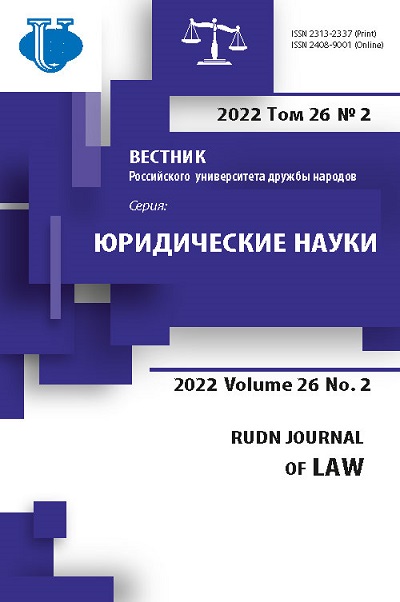The role of digitalization on the interaction of judicial and notarial authorities in conciliation procedures
- Authors: Begichev A.V.1
-
Affiliations:
- Peoples’ Friendship University of Russia (RUDN University)
- Issue: Vol 26, No 2 (2022)
- Pages: 485-500
- Section: PROCEDURAL LAW. PROSECUTOR SUPERVISION
- URL: https://journals.rudn.ru/law/article/view/31096
- DOI: https://doi.org/10.22363/2313-2337-2022-26-2-485-500
- ID: 31096
Cite item
Abstract
The article studies the issues of digital interaction between the court and the notary in the out of court conciliation procedures, which allows establishing new forms of protection of rights and legitimate interests of citizens and legal entities in resolving civil disputes. The author analyzes the possibilities of digital justice and derives the criteria for interaction between the notaries and the court when using mediation agreements concluded in a notarial form. The current state of the human rights activities of the electronic notary in certification of distance mediation agreements has been studied. The purpose of the article is to form an idea of new possibilities of the notary for notarizing remote mediation agreements and forming a promising platform for digital interaction between the notaries and the court, based on the analysis of legal acts and scientific sources. Among the methods applied are comparative legal, description, interpretation, and theoretical methods of formal and dialectical logic. Private-scientific methods including legal-dogmatic, and the method of interpreting legal norms were also used. The study showed that the remote execution of mediation agreements that have the status of enforcement documents, in the context of the increasing influence of digital technologies on the human rights activities of the court and notaries, is gaining importance in protecting the rights of subjects of economic relations, which provides an opportunity to reduce the burden on the court and save costly resources to reach consensus in a legal conflict for shorter time.
About the authors
Alexander V. Begichev
Peoples’ Friendship University of Russia (RUDN University)
Author for correspondence.
Email: begichev100@mail.ru
Doctor of Legal Sciences, Full Professor of the Department of Civil Law and Civil Procedure and Private International Law, Law Institute 6 Miklukho-Maklaya str., Moscow, 117198, Russia Federation
References
- Begichev, A.V. (2015) Execution of human rights functions of notaries in the judicial process. Nauchnoe mnenie. 3-2, 35-41. (in Russian).
- Begichev, A.V., Grebennikov, V.V. & Domanov, V.N. (2017) Human Rights Functions of Lawyers and Notaries as Civil Society Institutions in Russian Federation. International Journal of Environmental and Science Education - IJESE. 12 (1), 79-86.
- Branovitskiy, K. L. & Yarkov, V. V. (2021) Possible ways of the civil procedure transformation under digitalization and pandemic: predictive justice. Russian Law: education, practice, researches. (4), 19-26. https://doi.org/10.34076/2410_2709_2021_4_19 (in Russian).
- Ermakova, E.P., Frolova, E.E. & Sitkareva, E.V. (2020) New Trends in Developing Alternative Ways to Resolve Financial Disputes. Journal of Politics and Law. 13 (3), 280-286. https://doi.org/10.5539/jpl.v13n3p280
- Ermakova, E. P. & Frolova, E. E. (2022) Using Artificial Intelligence in Dispute Resolution. In: Inshakova A.O., Frolova E.E. (eds) Smart Technologies for the Digitisation of Industry: Entrepreneurial Environment. Smart Innovation, Systems and Technologies. Vol. 254. Springer, Singapore, pр. 131-142. https://doi.org/10.1007/978-981-16-4621-8_11
- Frolova, E. E. & Ermakova, E. P. (2022) Utilizing Artificial Intelligence in Legal Practice. In: Inshakova A.O., Frolova E.E. (eds.). Smart Technologies for the Digitisation of Industry: Entrepreneurial Environment. Smart Innovation, Systems and Technologies. Vol. 254. Springer, Singapore, pр. 17-27. https://doi.org/10.1007/978-981-16-4621-8_2
- Greene, R. (2018) The Laws of Human Nature. Kindle Edition. Viking Press
- Inshakova, A.O., Frolova, E.E., Rusakova, E.P. & Kovalev, S.I. (2020) The model of distribution of human and machine labor at intellectual production in industry 4.0. Journal of Intellectual Capital. 21 (4), 601-622. https://doi.org/10.1108/JIC-11-2019-0257
- Kashanin, A. V., Kozyreva, A.B., Kurnosova, N.A. & Malov, D.V. (2020) Information technologies in justice: state and prospects. Russia and the world. Analytical report. Moscow. Available at: http://xn--o1abds.xn--p1ai/wp-content/uploads/2020/07/w-informacionnie-tehnologii-v-pravosudii.pdf [Accessed 29th January 2022].
- Кашанин А.В., Козырева А.Б., Курносова Н.А., Малов Д.В. Информационные технологии в правосудии: состояние и перспективы. Россия и мир. Аналитический доклад. М., 2020. Режим доступа: http://xn--o1abds.xn--p1ai/wp-content/uploads/2020/07/w-informacionnie-tehnologii-v-pravosudii.pdf (дата обращения: 29.01.2022)
- Korsik, K.A. (2020а) Notaries and justice during the spread of coronavirus infection on the territory of the Russian Federation. Notarial'nyi vestnik. (04-05), 2-4. (in Russian)
- Korsik, K.A. (2020b) Mediation in the practice of a notary. Notarial'nyi vestnik. (9), 2-3. (in Russian)
- Sinenko, V.S. (2019) The principle of voluntariness of the mediation procedure: content and problems of implementation. Bulletin of the judicial community of the Belgorod region. (10), 40-45. (in Russian)
- Rusakova, E. & Frolova, E. (2022) Judicial reconciliation as a way to popularize the jurisdictional form of protection of rights and legitimate interests in modern Russia. The transformation of social relationships in Industry 4.0. Economic security and legal prevention. Information age publishing. 147-156
- Rusakova, E.P., Frolova, E.E. & Inshakova, A.O. (2021) The Procedure of Mediation in the Age of Industry 4.0. In: Popkova E.G., Sergi B.S. (eds.). Modern Global Economic System: Evolutional Development vs. Revolutionary Leap. ISC 2019. Lecture
- Notes in Networks and Systems. Vol. 198. Springer, Cham, pp. 947-953. https://doi.org/10.1007/978-3-030-69415-9_105
- Zarubina, M.N. (2012) Features and Problems of Implementation of the Principles of Mediation in Russia. Herald of Civil Procedure. (6), 180-185. (in Russian)
Supplementary files















